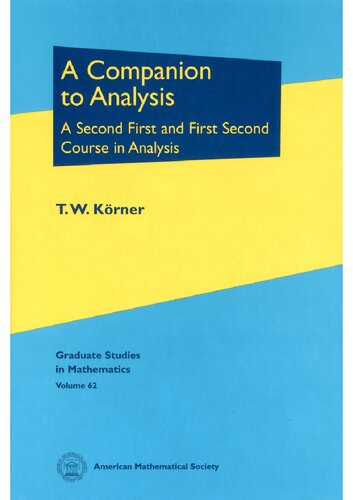

Most ebook files are in PDF format, so you can easily read them using various software such as Foxit Reader or directly on the Google Chrome browser.
Some ebook files are released by publishers in other formats such as .awz, .mobi, .epub, .fb2, etc. You may need to install specific software to read these formats on mobile/PC, such as Calibre.
Please read the tutorial at this link: https://ebookbell.com/faq
We offer FREE conversion to the popular formats you request; however, this may take some time. Therefore, right after payment, please email us, and we will try to provide the service as quickly as possible.
For some exceptional file formats or broken links (if any), please refrain from opening any disputes. Instead, email us first, and we will try to assist within a maximum of 6 hours.
EbookBell Team

5.0
110 reviewsA Companion to Analysis: A Second First and First Second Course in Analysis 608 pages
Partial Solutions for Questions in Appendix K of A Companion to Analysis 406 pages
2000 Mathematics Subject Classification. Primary 26-01
Many students acquire knowledge of a large number of theorems and methods of calculus without being able to say how they work together. This book provides those students with the coherent account that they need. A Companion to Analysis explains the problems that must be resolved in order to procure a rigorous development of the calculus and shows the student how to deal with those problems.
Starting with the real line, the book moves on to finite-dimensional spaces and then to metric spaces. Readers who work through this text will be ready for courses such as measure theory, functional analysis, complex analysis, and differential geometry. Moreover, they will be well on the road that leads from mathematics student to mathematician.
With this book, well-known author Thomas Körner provides able and hard-working students a great text for independent study or for an advanced undergraduate or first-level graduate course. It includes many stimulating exercises. An appendix contains a large number of accessible but non-routine problems that will help students advance their knowledge and improve their technique.